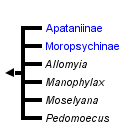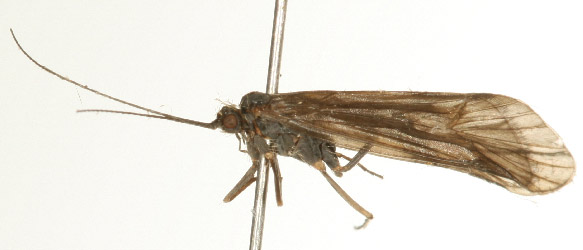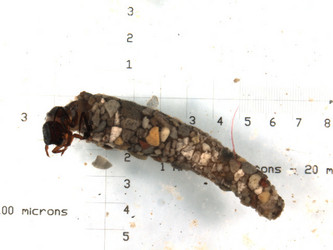Apataniidae
Ralph W. Holzenthal, Roger J. Blahnik, Aysha Prather, and Karl Kjer


This tree diagram shows the relationships between several groups of organisms.
The root of the current tree connects the organisms featured in this tree to their containing group and the rest of the Tree of Life. The basal branching point in the tree represents the ancestor of the other groups in the tree. This ancestor diversified over time into several descendent subgroups, which are represented as internal nodes and terminal taxa to the right.

You can click on the root to travel down the Tree of Life all the way to the root of all Life, and you can click on the names of descendent subgroups to travel up the Tree of Life all the way to individual species.
For more information on ToL tree formatting, please see Interpreting the Tree or Classification. To learn more about phylogenetic trees, please visit our Phylogenetic Biology pages.
close boxIntroduction
Apataniidae is a northern and montane group found in North America, Europe, and Asia. The family names dates to Wallengren (1886), but for most of its history it was included as a subfamily of Limnephilidae. Wiggins (1996) treated the group as a distinct family and subsequent workers have accepted this designation. There are nearly 200 species in 18 genera. Four genera, Allomyia Banks (Nearctic and eastern Palearctic, 23 species), Manophylax Wiggins (Nearctic and eastern Palearctic, 6 species), Moselyana Denning (Oregon, monotypic), and Pedomoecus Ross (Pacific northwest of North America, monotypic), form a monophyletic group (Gall 1994) separate from either subfamily.
Apataniid larvae construct cases of small rock pieces, although Manophylax larvae also add plant pieces to the upper surface (Wiggins 2004). Corbet (1966) documented parthenogenesis in some species of Apatania. Larvae occur in cool running waters, but at high elevations and extreme northern latitudes, some species of Apatania are found in lakes. Most larvae graze periphyton from rocks with scraper mandibles. Some species also occur in hygropetric habitats, some of which are dry for much of the year. The larvae of Moselyana are found in spring seepages, and are detritivores with toothed mandibles. (From Holzenthal et al., 2007)
References
Corbet, P.S. (1966) Parthenogenesis in caddisflies (Trichoptera). Canadian Journal of Zoology, 44, 981–982.
Gall, W.K. (1994) Phylogenetic studies in the Limnephilidae with a revision of the World genera of Goeridae (Trichoptera). Ph.D. Dissertation, University of Toronto, Toronto, 140 pp.
Holzenthal R.W., Blahnik, R.J., Prather, A.L., and Kjer K.M. 2007. Order Trichoptera Kirby 1813 (Insecta), Caddisflies. In: Zhang, Z.-Q., and Shear, W.A. (Eds). 2007 Linneaus Tercentenary: Progress in Invertebrate Taxonomy. Zootaxa. Zootaxa 1668:639–698.
Wallengren, H.D.J. (1886) Skandinaviens arter af Trichoptera-familjen Apataniidae. Entomologisk tidskrift, 73–80.
Wiggins, G.B. (1996) Larvae of the North American Caddisfly Genera (Trichoptera). University of Toronto Press, Toronto, 457 pp.
Wiggins, G.B. (2004) Caddisflies: the underwater architects. University of Toronto Press, Toronto, 292 pp.
Title Illustrations

| Scientific Name | Apatania zonella |
|---|---|
| Specimen Condition | Dead Specimen |
| Life Cycle Stage | Adult |
| View | Lateral |
| Source Collection | Barcode of Life Database (BOLD) |
| Scientific Name | Allomyia sp. |
|---|---|
| Creator | Karl Kjer |
| Identified By | David Ruiter |
| Life Cycle Stage | Larva |
| Source Collection | Barcode of Life Database (BOLD) |
About This Page
Ralph W. Holzenthal

University of Minnesota, St. Paul, Minnesota, USA
Roger J. Blahnik

University of Minnesota, St. Paul, Minnesota, USA
Aysha Prather

Centre for Biodiversity and Conservation Biology, Royal Ontario Museum, Toronto, Ontario, Canada
Karl Kjer

Rutgers University, New Brunswick, New Jersey, USA
Correspondence regarding this page should be directed to Ralph W. Holzenthal at , Roger J. Blahnik at , Aysha Prather at , and Karl Kjer at
Page copyright © 2010 Ralph W. Holzenthal, Roger J. Blahnik, Aysha Prather, and Karl Kjer
 Page: Tree of Life
Apataniidae.
Authored by
Ralph W. Holzenthal, Roger J. Blahnik, Aysha Prather, and Karl Kjer.
The TEXT of this page is licensed under the
Creative Commons Attribution-NonCommercial-ShareAlike License - Version 3.0. Note that images and other media
featured on this page are each governed by their own license, and they may or may not be available
for reuse. Click on an image or a media link to access the media data window, which provides the
relevant licensing information. For the general terms and conditions of ToL material reuse and
redistribution, please see the Tree of Life Copyright
Policies.
Page: Tree of Life
Apataniidae.
Authored by
Ralph W. Holzenthal, Roger J. Blahnik, Aysha Prather, and Karl Kjer.
The TEXT of this page is licensed under the
Creative Commons Attribution-NonCommercial-ShareAlike License - Version 3.0. Note that images and other media
featured on this page are each governed by their own license, and they may or may not be available
for reuse. Click on an image or a media link to access the media data window, which provides the
relevant licensing information. For the general terms and conditions of ToL material reuse and
redistribution, please see the Tree of Life Copyright
Policies.
- First online 17 July 2010
- Content changed 20 July 2010
Citing this page:
Holzenthal, Ralph W., Roger J. Blahnik, Aysha Prather, and Karl Kjer. 2010. Apataniidae. Version 20 July 2010 (under construction). http://tolweb.org/Apataniidae/14617/2010.07.20 in The Tree of Life Web Project, http://tolweb.org/









 Go to quick links
Go to quick search
Go to navigation for this section of the ToL site
Go to detailed links for the ToL site
Go to quick links
Go to quick search
Go to navigation for this section of the ToL site
Go to detailed links for the ToL site